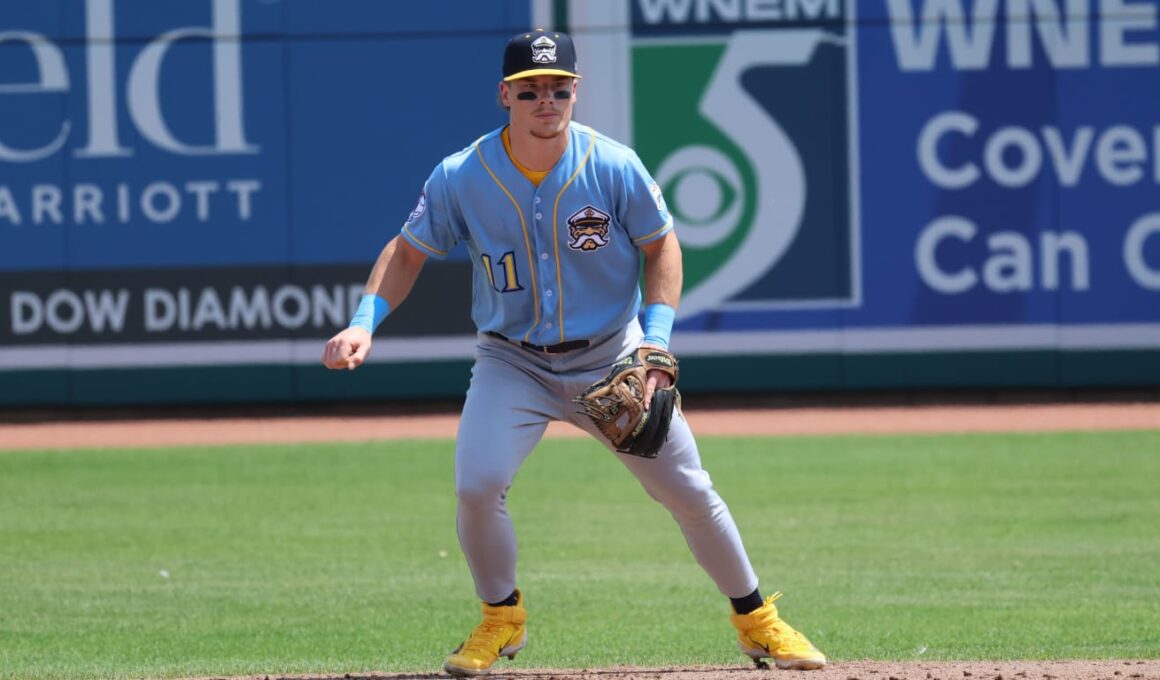‘It’s my love … my passion’: A Q&A with No. 1 Draft pick Bazzana
EASTLAKE, Ohio — Once the frenzy of firsts — the first overall pick in the MLB Draft, the first big paycheck, the first introductions and interviews — has calmed, you find him here in the shadow of the Classic Park scoreboard.
Here, second baseman Travis Bazzana can take a brief break in his pregame routine with the High-A Lake County Captains and reflect on this wild, weird time in his life. He’s accustomed to big changes, having made the trek from his native Australia all the way to Oregon State, where he proved himself worthy of the Cleveland Guardians’ first-ever No. 1 overall selection. But embarking upon his professional career has been an even bigger test for the 21-year-old Bazzana, who is not only trying to prove himself a worthy 1-1 but also blaze a new trail for other Aussies.
His .167 average and .640 OPS through 36 at-bats is evidence that the adjustment isn’t easy. But Bazzana has a clear-eyed approach to his craft that will serve him well and a gift for articulating his goals that we think fans will find interesting.
MLB.com: You’re only about 10 games into your professional career, so I’m more interested in process than performance. I’m sure your life has been a whirlwind these last couple months. Where’s your head at right now with your life having changed so much in such a short amount of time?
Bazzana: I’m just trying to continue to have a good routine and understand my schedule day to day and just best prepare myself to go out and have success. Building the relationships with teammates and the coaching stuff is super important and something I value right now. And yeah, just trying to be me and get my feet under me and go out and have fun doing it. Just trying to have clarity and prepare the right way.
MLB.com: Obviously, the experience in college was your adjustment to the United States. But you’re in such an unusual position, being the first first-rounder from Australia. How is that adaptation to the Minor League life, travel, etc.?
Bazzana: It’s been fun. Really good group of guys here. Competition’s great. The stadiums we’ve played in have been good atmospheres, good people. At the end of the day, it’s been baseball. I’ve just been trying to get myself going and just be the best version of me, best teammate, best player I can be.
MLB.com: You mentioned routine. Take me through your routine. I saw you take BP, you do your individual fielding drills, you do conditioning. What else is involved in your pregame, in terms of getting you right for a game?
Bazzana: I’m always pretty energized to play. I’m a very high-strung, energetic person. So I don’t really need anything extra to energize me for the game. I kind of need to calm and hone my focus. So pregame, if I get the chance — if the schedule and time and space allow — I like to take some breath work or take a nap, just to get that calm, that focus, maybe do some visualization. It’s something I did all throughout college. But other than that, earlier in the day, it’s just about preparing your body to go out and tackle the day. Eating right, sleeping right the night before, and then movement prep. It’s strenuous rotating and running. Routines are just about consistency and trust, and they allow you to go onto the field with a clear head and a belief in yourself to go out and do it. So yeah, it’s been interesting, trying to get my routines dialed in and the things I want to do to prepare for a game now that it’s a different schedule.
MLB.com: So translating it to a different environment, different clubhouse?
Bazzana: Yeah, like team things, like how I need to be at different meetings, right? That’s part of the process.
MLB.com: Was that routine built through trial and error through the years, or was there someone or something that pointed you in the right direction?
Bazzana: It just built over time. And you try things. Some things work, some things don’t. And then you learn from the best teammates you have and the things you can find out through the internet. You start to figure out ways that you can prepare your mind and body to be ready and reduce your risk of injury and be ready to perform. I’m competitive, and I want to have that edge, and those are the kind of things that can benefit you, especially over a long season and a large sample size.
MLB.com: I know you’re an avid reader, and there’s that book — “Atomic Habits” [by James Clear] — that’s been an influence on you, right?
Bazzana: Yeah, that was one of the first books that I read by choice, as a 14- or 15-year-old. And it was just a good starting point with, again, routines and understanding the power of consistency and how you can get yourself to — without motivation or anything — just do the things you need to do that make you better. It’s a very simple, easy to understand book, and it’s got some good key checkpoints that I think everyone can take from. I think it’s a great one that a lot of kids could benefit from.
MLB.com: I know a lot of big leaguers reference that as well. So in that process of adapting, what have you noticed about the pitching at this level and how people are approaching you and that sort of thing?
Bazzana: Obviously the stuff as a whole, the pitchers have a lot of great arsenals in professional baseball. Everyone’s throwing hard. Everyone’s got nasty stuff, and some guys command it, some don’t. I think the one thing that’s been a clear thing is guys have great feel for their secondaries. There’s that stuff here and there in college baseball, but [in professional baseball] they’re attacking, and they’re not afraid to give you their best stuff early. They’re not timid. So you’ve got to be ready to hit from pitch one. I trust in my ability. I know I’m gonna go out and have success. I’ve just got to trust myself and keep sticking to the right process.
MLB.com: You’re big on information. How does the information available to you at this level compare to college — the information about yourself and who you’re facing?
Bazzana: For the most part, it’s fairly similar, because it’s running through the same databases. Like, it’s a TrackMan. Where it differs is the Hawk-Eye [the technology behind Statcast] is different, but I don’t really have much access to that. That’ll track what I’m doing on the field, which balls I’m getting to. We don’t have that in college. But in terms of the tracking, like the batted-ball data: Am I swinging at strikes? Which pitches am I swinging and missing at? I had access to that in college, and I could evaluate why certain outcomes are prevalent because of those numbers and stuff. But I think that I’m interested, after the season, to dive into some of that Hawk-Eye stuff I’ve never seen before, to see how I’m moving on the field and defensively, where I’m getting to balls and where I’m not.
MLB.com: It’s amazing to think what’s available to the modern ballplayer. And I’m sure for some guys, it’s probably overwhelming. You seem to have a really good approach to how it can benefit you. Now that you’ve played back-to-back days for the first time, how does your schedule look moving forward?
Bazzana: It’s been a build-up. You don’t want to have a huge rise in acute workload. Like if you don’t come prepared to Spring Training, you’ll see obliques, hammies, elbows [get injured], and it’s just due to that rise in workloads. You have to prepare. You have to build up. I think the departments of the Guardians are very well-versed on that and understanding workload management. And they’ve been building me up. So it was three games a week, it was four, now this week it’s five. It might be five or six next week. Building me up to where I can play every day without the workload being over the top.
MLB.com: What do you do to unwind in the midst of all this transition?
Bazzana: You need things to unwind. I golf, I read, I talk to people that I’m close with, friends, family, whether it’s on the phone or just text message. But yeah, just hang out, eat food with the guys. There’s a lot of different things, but I’d say those are the key things for me.
MLB.com: We’re sitting here in Eastlake, Ohio. It’s a long way from Australia. And not everyone can do what you’re doing and what you’ve done to this point — to leave home, to leave your family, your friends, and to embark upon this adventure. What is it within you that made that possible?
Bazzana: I think I just always had big dreams, big goals, and I didn’t want to ever sell myself short by not aiming really high. Why would I? I’d rather aim extremely high and miss and be like, “Damn, I gave it everything I’ve got” versus getting somewhere that was a very safe goal and just be satisfied, you know? So I just kind of take the mindset that if someone else is gonna go be great, why not be great? I think I’m pushed by the fact that I can be the first to do a lot of those things from Australia. And I see an opportunity to grow the game there. So that motivates me, just wanting to see where I can take it. I’ve been doing it my whole life. It’s my love. It’s my passion. I love baseball so much. I want to see where I can take it. I want to maximize the journey, you know?
MLB.com: That all sounds like the right mindset for a 1-1. To be 1-1 any year is a major responsibility, but you’ve already kind of embraced that in a way with your goals for your home country. And so it’s almost like being a potential future franchise face seems like nothing compared to being the face of a country, so to speak?
Bazzana: I don’t know if I’ll be the face of the country, but I might bring some sports fans to the game and then give the next generation of baseball players someone to look up to. So yeah, that’s pretty exciting. The 1-1 [status] is just a step for those people back home. For me, 1-1, 1-2, 1-3, whatever it was going to be, I wanted to be a Guardian, truly, and I’m just happy to be here. I’ve got to keep pushing forward, and I’m going to continue to work hard and get better. And it should be a great journey.








